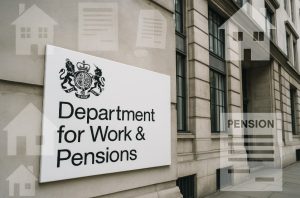For many in the UK, the dream of homeownership can feel out of reach, especially for those receiving government benefits. The question, “Can I get a mortgage on benefits?” arises frequently, and the answer isn’t a simple yes or no.
While it is indeed possible to secure a mortgage while on benefits, it depends heavily on factors such as the type of benefits received, your financial stability, and the lender’s criteria.
This guide provides expert insight into the options, challenges, and steps to improve your chances of getting approved. Whether you’re on Universal Credit, Disability Living Allowance (DLA), or other forms of support, understanding the landscape is key to making informed decisions.
What Types of Benefits Can Be Considered for a Mortgage Application?

Lenders in the UK take various types of benefits into account when assessing an applicant’s income. However, each lender has different criteria, and not all benefits are treated equally. Those most commonly considered include:
- Universal Credit
- Personal Independence Payment (PIP)
- Disability Living Allowance (DLA)
- Employment and Support Allowance (ESA)
- Carer’s Allowance
- Child Benefit and Child Tax Credit
- Income Support
- Attendance Allowance
Disability-related benefits like PIP or DLA are generally considered more reliable as they tend to be awarded on a long-term basis. Child-related benefits can be taken into account but may be scrutinised more closely, especially if they are expected to reduce or end before the mortgage term finishes.
Lenders will typically look at the stability and duration of the benefit payments, and whether they are likely to continue for the foreseeable future. In some cases, benefits are accepted only as supplementary income, not as the primary source.
Are There Mortgage Lenders Who Accept Benefit Income?
Not all high-street banks and building societies are willing to lend to applicants relying solely on benefits, but there are lenders and brokers who specialise in helping people with alternative income sources.
Mainstream banks may require that benefits be combined with employment income, pension, or self-employment. However, specialist lenders are more open to flexible criteria and may offer products tailored to applicants in receipt of benefits.
Mortgage brokers can play a key role here, especially those familiar with lenders who deal with benefit-based applications. They help match applicants with lenders whose policies allow benefit income to count toward affordability.
Some building societies, especially regional ones, are more willing to assess applications individually and may be more open to unique financial situations.
How Does Universal Credit Affect Mortgage Eligibility?

Universal Credit replaces multiple older benefits, including Income Support, Jobseeker’s Allowance, and Housing Benefit. Its impact on mortgage eligibility largely depends on how much of your income it represents and whether it’s combined with other income sources.
Lenders assess:
- Whether Universal Credit is a primary or supplementary income
- The total amount received monthly
- Duration and stability of the payments
If you receive other income like part-time earnings or disability benefits, your overall application may be stronger. For people relying solely on Universal Credit, the range of available mortgage products is narrower. Some lenders require a history of receiving Universal Credit for a set number of months before considering it.
When Universal Credit includes the housing element, lenders typically exclude this from affordability calculations as it is intended to cover rent rather than mortgage repayments.
Can I Use Disability Benefits to Apply for a Mortgage?
Disability-related benefits are among the most accepted forms of non-employment income when applying for a mortgage. This is because many of them are paid long-term and are not subject to income fluctuations.
If you receive Disability Living Allowance or Personal Independence Payment, lenders will want to see documentation confirming the benefit is ongoing. In many cases, these benefits are reviewed only every few years or are awarded indefinitely.
Applicants may need to provide:
- Award letters from the DWP
- Bank statements showing regular payments
- Evidence of the long-term nature of the condition
In situations where the disability affects the applicant’s working ability, the benefits may be the only source of income. Lenders will factor in expenses and affordability based on this single income stream, which may reduce the loan amount available.
What Are the Government Schemes That Support Buyers on Benefits?
For those receiving benefits and looking to buy a home, several UK government schemes are designed to improve access to affordable homeownership. These schemes can significantly reduce the deposit required and make monthly costs more manageable.
| Scheme | Who It’s For | Key Benefits |
| Shared Ownership | Low-income buyers, benefit recipients | Buy 25%-75% of a home, pay rent on the rest |
| Support for Mortgage Interest (SMI) | Homeowners on qualifying benefits | Government loan to pay mortgage interest |
| Right to Buy | Council/housing association tenants | Buy your rented home at a discounted rate |
| First Homes Scheme | First-time buyers, key workers | New homes offered at 30%-50% below market price |
Shared Ownership is one of the most accessible options for those on benefits, as it allows you to buy a share in a property and pay rent on the remaining portion. This makes monthly payments more affordable.
Support for Mortgage Interest (SMI) isn’t a purchase scheme, but it helps those who already own their home by providing a government loan to cover the interest on their mortgage. It’s particularly useful for claimants of Universal Credit, Income Support, or ESA.
How Can I Improve My Chances of Getting a Mortgage on Benefits?
Getting a mortgage while on benefits is possible, but preparation is essential to improving your chances of approval. Lenders are mainly concerned with your ability to repay the loan, so demonstrating financial stability is key.
Here are some ways to strengthen your application:
- Combine benefits with employment income, even part-time, to show multiple income streams
- Save for a larger deposit, which can reduce the loan-to-value ratio and risk for the lender
- Check your credit report and improve your credit score by clearing debts and making timely payments
- Provide full documentation, including benefit letters, bank statements, and expense breakdowns
- Use a mortgage broker who understands benefit-based lending and has access to a wider panel of lenders
Even if you’re not working, having savings, assets, or a guarantor can make your application more attractive to lenders.
What Documents Do I Need to Apply for a Mortgage While on Benefits?

When applying for a mortgage, accurate and complete documentation is critical. Lenders need to verify your income, benefits, and overall financial position to assess your ability to repay the mortgage.
Here’s a list of commonly required documents:
- Award letters from DWP showing your current benefits
- At least 3 to 6 months of bank statements
- Recent utility bills or council tax bill for address proof
- Photo ID, such as a passport or driving licence
- Breakdown of your monthly expenses
- Credit report (some lenders may obtain this directly)
If you have any part-time or freelance income, payslips or invoices may also be required. Ensure that your documentation is recent and matches the information declared on your mortgage application.
What Are the Common Challenges When Applying for a Mortgage on Benefits?
Although there are paths to homeownership for those on benefits, applicants can face several challenges during the mortgage process. Understanding these in advance helps you prepare better.
| Challenge | Why It Happens | How to Address It |
| Limited lender availability | Some lenders have strict income rules | Use a broker to access specialist lenders |
| Short-term or variable benefits | Viewed as less reliable | Provide documentation on long-term awards |
| Sole reliance on benefits | Seen as higher risk by lenders | Supplement with savings or part-time income |
| Lower borrowing capacity | Benefits often count less in affordability checks | Focus on smaller properties or schemes |
| Higher deposit requirements | Higher risk can lead to higher deposit demands | Save in advance or use Shared Ownership |
Being prepared for these challenges allows you to present a stronger application. For some, using a guarantor or applying jointly with someone who has employment income can help overcome obstacles.
Can I Get a Mortgage If I’m on Benefits and Have a Bad Credit Score?
Yes, although you may be limited in your options. A bad credit score, combined with benefit-based income, is considered higher risk by many lenders. However, specialist lenders exist specifically for applicants in these circumstances.
Important factors to consider:
- You may be asked for a higher deposit, often 15% or more
- Interest rates are likely to be higher than average
- Lenders may cap the loan amount at a lower multiple of your income
Improving your credit score before applying can significantly increase your chances. Actions like registering on the electoral roll, paying bills on time, and avoiding new credit applications can help improve your score over a few months.
Is Shared Ownership a Good Option for People on Benefits?
Shared Ownership is one of the most viable homeownership options for those receiving benefits. It is designed to help people on low to moderate incomes get onto the property ladder.
Key benefits of Shared Ownership:
- Requires a lower deposit, often just 5% of your share
- Monthly payments are typically lower than full mortgage payments
- You can increase your ownership share over time (known as staircasing)
Most housing associations offering Shared Ownership assess affordability and may accept benefits as part of your income. However, you must still be able to cover both the rent and mortgage portions. Some Shared Ownership homes are also adapted for people with disabilities, making them more accessible.
What Should I Know Before Applying for a Mortgage on Benefits?

Before you begin the mortgage application process, it’s important to be fully aware of your financial standing and the criteria set by lenders. Preparation makes a significant difference in how your application is assessed.
Consider the following before applying:
- Review your monthly income and expenses to determine realistic affordability
- Speak to a mortgage advisor who has experience with benefit income
- Understand the types of properties you can afford, especially if using Shared Ownership
- Keep your documentation organised and up to date
- Research available government schemes and determine your eligibility
Being well-informed gives you a better chance of approval and helps you make decisions that suit your financial circumstances.
Frequently Asked Questions
Is it harder to get a mortgage on benefits compared to employment income?
Yes, because lenders see employment as more stable. However, long-term benefits can be equally viable with the right lender.
Do mortgage brokers charge for helping benefit claimants?
Some brokers do charge a fee, but many offer free consultations or are paid by the lender upon approval.
Can I apply jointly with someone who is employed?
Yes, applying jointly with an employed partner or family member improves affordability and chances of approval.
Will receiving benefits reduce how much I can borrow?
Yes, often the borrowing amount may be lower than if you were employed, depending on the lender’s criteria.
Can pensioners on benefits get a mortgage?
Yes, but most lenders have age limits and may require proof of pension income and affordability.
Do all lenders consider Housing Benefit as income?
No, many lenders exclude Housing Benefit because it’s designed to pay rent, not mortgages.
How long does the mortgage process take for people on benefits?
It usually takes 4 to 8 weeks, depending on the lender, documentation, and whether a broker is involved.





